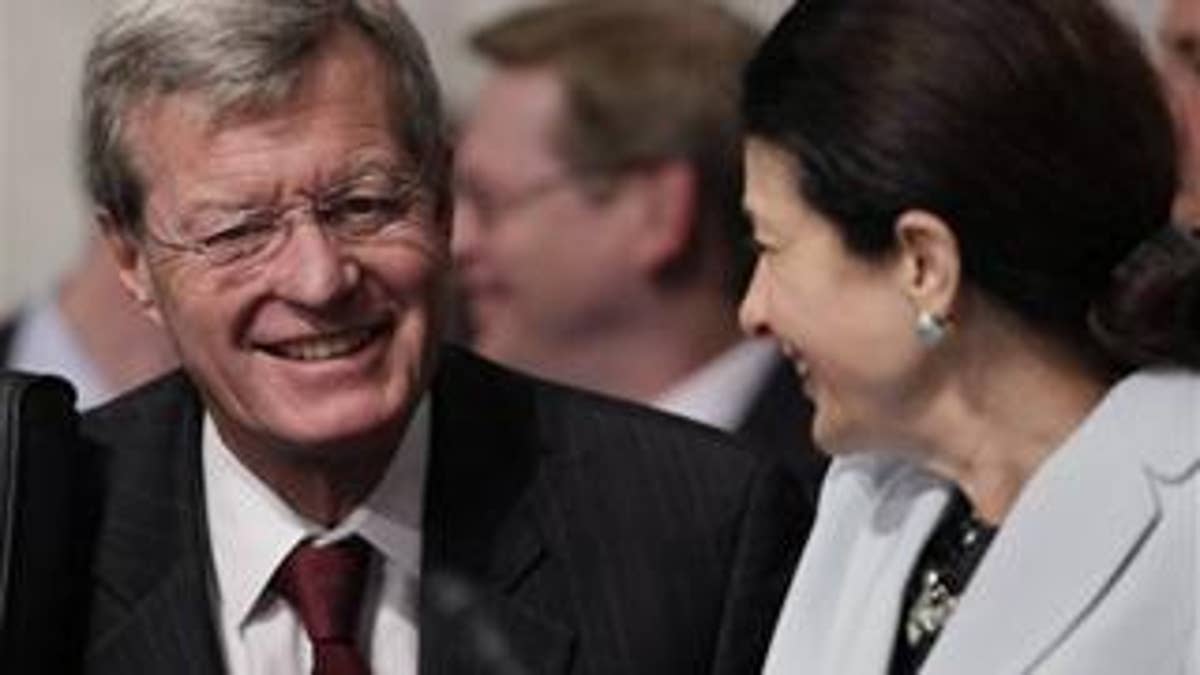
Health care reform cleared a major hurdle Tuesday, as the Senate Finance Committee voted to send its version of the legislation to the Senate floor after months of closely watched deliberations.
The committee voted 14-9 in favor of the package. One Republican, Maine Sen. Olympia Snowe, broke with her party to support the bill. All 13 Democrats on the panel voted in favor of it, while the rest of the Republicans opposed it.
The panel was the last of five to act on health legislation, and the vote marked the biggest advance so far toward health care reform, as the committee's legislation is considered the best building block for a compromise plan in the full Senate.
President Obama hailed the vote as a "critical milestone," in brief remarks late Tuesday.
"We are now closer than ever before to passing health care," he said. "But we're not there yet."
Much work still remains on the package, and Senate Republicans made clear after the committee vote that they will continue to fight the bill.
"It's going to cost us an arm and a leg," Sen. Orrin Hatch, R-Utah, said. "The costs of this are astronomical."
The House still needs to bring a unified version to the floor, and Senate Majority Leader Harry Reid will begin working with White House staff, Finance Committee Chairman Max Baucus, D-Mont., and others to blend the Finance bill with a more liberal version passed by the Health, Education, Labor and Pensions Committee -- before bringing a final product to the Senate floor.
If passed, the legislation would then go to a conference committee to reconcile differences between the House and Senate bills before heading to the president's desk.
The 10-year, $829 billion Finance Committee bill includes consumer protections such as limits on copays and deductibles and relies on federal subsidies to help low-income families purchase coverage. Insurance companies would have to take everyone, and people could shop for insurance within new state marketplaces called exchanges.
Medicaid would be expanded, and though employers wouldn't be required to cover their workers, they'd have to pay a penalty for each employee who sought insurance with government subsidies. The bill is paid for by cuts to Medicare providers and new taxes on insurance companies and others.
Unlike the other health care bills in Congress, Baucus' would not allow the government to sell insurance in competition with private companies, a divisive element sought by liberals.
Last-minute changes made subsidies more generous and softened the penalties for those who don't comply with a proposed new mandate for everyone to buy insurance. The latter change drew the ire of the health insurance industry, which said that without a strong and enforceable requirement not enough people would get insured, and premiums would jump for everyone else.
The road to the Tuesday vote was paved with bickering and complaints. At the start of discussion, the top Republican on the Senate Finance Committee said that he's still concerned about the potential for more government control over health care.
Sen. Charles Grassley's comments, and those of other Republicans, aired the lingering partisan divisions on the panel, even as Baucus stressed that his bill is a "balanced plan" that should win bipartisan support and eventually pass the full Senate.
"With this markup nearing its conclusion, we can now see clearly that the bill continues its march leftward," Grassley, R-Iowa, said.
But Baucus urged his colleagues to "make history" by sending his comprehensive overhaul to the floor of the Senate and one big step closer to the president's desk.
Snowe's support was the most sought-after Republican vote by Democrats for months. The Maine Republican could be the only member of her party to vote for health care reform, though she cautioned Tuesday that support for the committee bill does not guarantee support for a final product.
"When history calls, history calls," she said, even though she had some criticism of the bill.
She was among several key senators still on the fence over the pivotal package going into deliberations Tuesday, even though leadership aides said they were confident the bill would win enough backers.
But three previously undecided Democrats announced their support Tuesday, bolstering Baucus' majority on the panel.
Sen. Ron Wyden, D-Ore., said Tuesday afternoon he would support the bill, despite concerns that it could increase costs for families with mandates to obtain coverage and inadequate subsidies. Sen. Blanche Lincoln, D-Ark., also announced her support, though adding the same warning that her backing is not guaranteed down the road.
Sen. Jay Rockefeller, D-W.Va., was the last to unveil his support. The liberal Democrat wants nothing short of a government-run insurance plan in the bill, and he thinks the Finance Committee's "co-op" system is not sufficient. He reiterated those views Tuesday.
The Associated Press contributed to this report.




